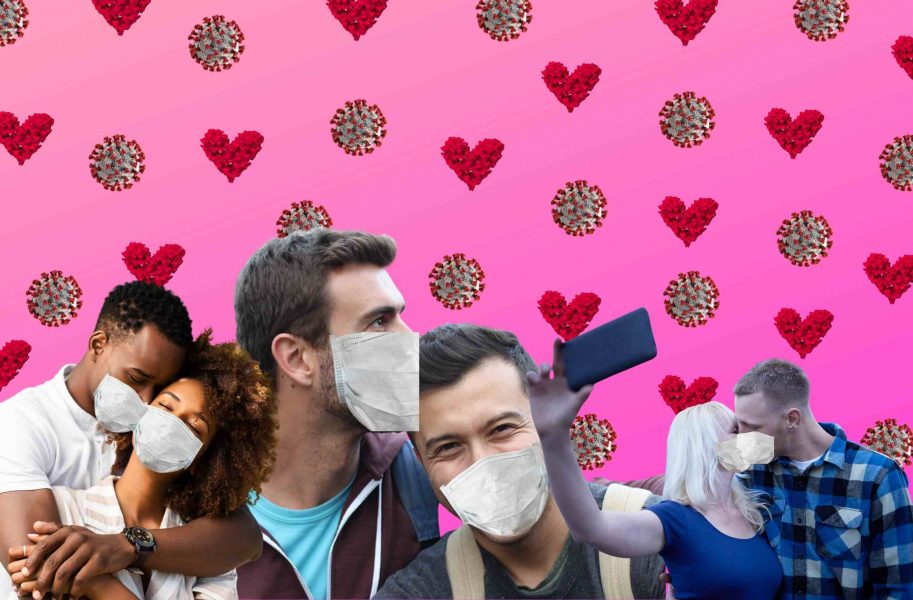Dating in the Days of Disease

Sienna White explores the consequences of Covid-19 on dating and how people still manage to find some love despite the pandemic.
It is widely recognised that Covid-19 has impacted the way people interact with each other. The nature of the virus has forced many people apart, at a time when intimate human connection is invaluable for emotional wellbeing. Unsurprisingly, one of the largest social victims of the pandemic has been dating. How does one begin, or continue, a meaningful romantic relationship when it must be conducted amidst unprecedented levels of governmental control over the nations’ personal lives?
A proportion of people have decided to simply abandon romance for the time being: a survey by YouGov found that 45% of Brits who dated before lockdown said that they had fully paused their love lives. The personal, financial and career-based stress that the global pandemic has induced for many does not, understandably, provide the ideal environment for a love story to flourish.
Alternatively,some have seemingly chosen to use the year that got away as an opportunity to reconnect with the one that got away; 7% of participants admitted to talking to an ex-partner again during lockdown. Evidently, a portion of those seeking a sense of stability have taken refuge in nostalgia. The rules may prohibit coming within 2 metres of people, but there is no social distancing required on a trip down Memory Lane!
45% of Brits who dated before lockdown said that they had fully paused their love lives.
YouGov also noted that a notable percentage of the people questioned had signed up to new dating apps, or found themselves swiping more: perhaps a predictable solution in the age of social media. Sites such as Tinder, Hinge and Bumble have seen a marked rise in swipes during the pandemic – Tinder even including an added video chat function while physical dates were completely off the table.
As the first lockdown measures were eased, an entirely new trend of ‘socially distanced dating’ emerged. Even with the loosening of restrictions, local and national rules have meant that traditional venues such as cinemas, restaurants and bars are not always an option. As a result, a ‘return to nature’ type approach, involving city or country walks, hikes or even bike rides have become a novel way for people to get to know each other or maintain in-person contact, in line with coronavirus safety guidelines.
Many would find the thought of dating without a structured activity anxiety-inducing, but Martha, a student at Exeter University, has seen it as a positive experience: “I’ve found it to be less stressful than regular dating – it’s hard to overthink taking a walk and grabbing a coffee! It does also mean things can get intense earlier on – there’s a distinct lack of anecdotes these days, so it’s a lot easier to have deeper conversations”.
20% of Brits are having less sex, with this number rising to 38% in the 18-24 age category.
Unfortunately, the reality for most is that this type of dating – from a distance – is an inconvenient alternative; the barrier to physical intimacy for both new couples and those living apart is undeniable. Yougov clarified that 20% of Brits are having less sex, with this number rising to 38% in the 18-24 age category.
Some more established (or just more eager) couples who, faced with the prospect of potentially spending months apart or taking the plunge and moving in together, have opted for the latter.
The Government outlined its ultimatum for romantic partners early on in the original countrywide lockdown, stating that those struggling with this dilemma should ‘Test the strength of their relationship and decide whether one wishes to be permanently resident in another household’. Health Secretary Matt Hancock rounded off the Government’s directions with the clear-cut counsel to ‘Make your choice and stick with it’.
Looking forward, though, the connections that have been forged, rekindled, and tested during this time may emerge more meaningful than before.
The complexity of these available options is clear. Being plunged into an unexpected cohabitation is an immensely trying test of compatibility, whilst prolonged separation can put strain on even the strongest relationship. The BBC reported in July that relationship counsellors were “bracing themselves for a ‘post-lockdown reckoning’ similar to that usually seen after Christmas”.
It seems a grim but unavoidable conclusion that dating, be it a new venture or an established romance, has been made more challenging by the globally felt effects of Coronavirus. Looking forward, though, the connections that have been forged, rekindled, and tested during this time may emerge more meaningful than before. Perhaps this will even pave the way for a reconceptualization of the way we both date and love. Whatever the case, the fluctuating nature of the ongoing pandemic means there may be a while yet before final conclusions can be drawn.


